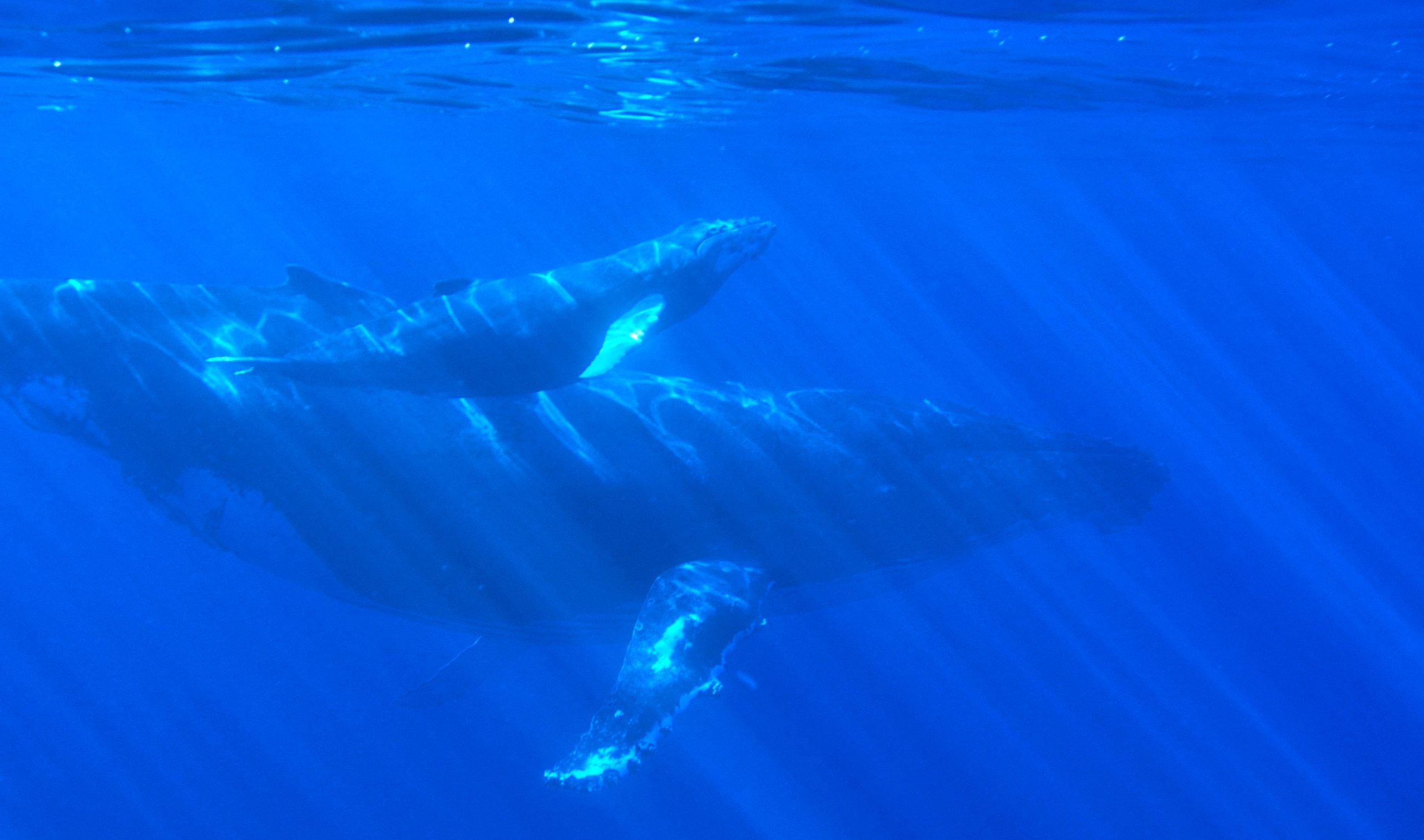On feeling small and full of wonder
Madeline D'elia for Mockingbird // August 13, 2021, 12:33 am

The mystery of whales in the ocean depths inspires wonder at how God takes a deep void and brings forth hope, writes Madeline D'elia. Photo by Swanson Chan on Unsplash.
Last month, in the middle of the Salish Sea, I fell in love with humpback whales.
It was as whimsical and romantic as it sounds, surrounded by miles of water and the hazy perimeters of Washington’s Olympic Mountains and Victoria’s tall pine trees and yellow Scotch broom flowers. The only sound was the gentle lapping of water against the sides of the boat as it slowly rocked back and forth. Our whale-watching group waited, all of us perched on the top deck, scanning the sea for any signs of a blowhole.
And then, suddenly, before anyone had time to yell “There she blows”, a 50-ton charcoal gray creature breached the surface and broke the stillness, its impossibly large tail leaping through the water only to slide back down again.
As we all rushed to the side of the boat, gripping the railing with smiles of glee, I was certain that I had never seen anything that filled me with so much wonder.
Scale of existence
Perhaps Philip Hoare described how I felt best in his book, The Whale:
In just a few seconds, this creature whose existence I had never considered before made me consider my own.
“In that one motion, my entire presence is undermined. I feel, rather than see, this eighty-foot animal swimming below. Knowing it is there tugs at my gut, and something inside makes me want to plunge in and dive with it to some unfathomable depth where no one would ever find us.”
Though only breached for moments, that snapshot seemed to grasp on to me and not let go.
In just a few seconds, this creature whose existence I had never considered before made me consider my own. I was impossibly small in its massive presence, incredibly weak in the wake of its movement, incredibly mystified by its life, which moved and breathed thousands of feet below me.
As I gripped the railing beside me and joined the Moby Dicks of the world, it dawned on me how out-of-control I felt in the face of this mysteriously magnificent animal.
Captivated by creation
The grip of this moment lasted longer than the whale watching tour, longer than my time in British Columbia, and longer than my return to “normal” life.
God’s love is written all over creation.
When friends asked me how my vacation was, I have to confess that the only thing I talked about was whales.
At a wedding, I found myself initiating small talk by asking: “Did you know that baby whales gain 100 pounds an hour while nursing?”
I talked about marine biology so much at my friend Joseph’s birthday party that I had conversations with three separate people about it and another friend exclaimed at some point: “Are you still talking about whales?”
I listened to orcasounds.net to hear the different sounds of whale pods on my walk to work in the mornings, and considered my finances as I fell asleep to figure out how I could see more whales.
I admit, I was mystified. In love, intrigued, whatever you would call it.
Beautiful helplessness
The mysteries of the humpback whales enchant me.
Their whale song alone, lasting for 10-20 minutes and being repeated for hours at a time, is produced for no apparent reason. Biologists speculate it may be related to mating but, truthfully, no one is quite sure.
The reason they breach is also a mystery. For show? For mating? For fun? There are speculations, but no one really knows why.
Behold whales and you feel helpless, out of control, the beautiful kind where we feel small and God feels big.
But more than the mysterious facts surrounding whales, it is their sheer existence that fills me with such wonder.
The mystery that made me feel out of control in the first place; the world around me so vast and unexplainable, unseen and unknown even to those who build their lives around trying to understand.
A few nights ago I embarked on a walk with some friends and we read the words of Becca Stevens, an Episcopal priest in Memphis who works with victims of sex trafficking, and her contemplations on nature:
“God’s love is written all over creation. It begins when God takes the deep and the darkness and, instead of destroying these things, makes them part of creation. God calls it very good.
“To me, this means that nature is good, we are good, and we are all created together by a loving God who destroys nothing in creating – deep and darkness, earth and light, knit together in a creation that is both unified and diverse.”
Deep and darkness, earth and light. The goodness of nature combined with its power and terror.
Karen, who was leading our walk, asked Maddy, Renee and me how we hold the darkness of the world in the same hand as the light, how we reconcile a loving God with tsunamis and droughts, with poverty and famine and heartache.
“God’s love begins when God takes the deep and the darkness and makes them part of creation.”
And I thought about the mystery of this darkness, and Becca’s words which were spoken in her daily life that encounters so much horror. It was a hard question, how darkness can be integrated into light. How God takes a deep void and brings forth hope.
And all I could muster was: “It makes me think of whales.”
Yes, I was, again, talking about whales.
These big, beautiful creatures spend 95% of their lives in the ocean, one of the deepest and darkest places we know about. And without warning, they pull 30,000 pounds of blubber against gravity and leap out of the water for unexplainable reasons.
They sing mysterious songs, and are surprisingly peaceful, and they fill everyone who sees them with wonder.
Because from such a dark, deep place comes beauty.
Behold them for a second and you feel helpless, out of control; but not the terrible kind where chaos presses into you and fills you with panic, but the beautiful kind where we feel small and God feels big, and the mysteries of the world are acceptable to be unexplained.
Peaceful in our ignorance, because we were never meant to know, but perhaps just to feel small.
This article was first published by The Mockingbird, a hardcopy print magazine and is republished with permission. You can find more articles here or sign up for a subscription here.
RELATED STORIES:
Beyond access ramps, “Let Us Consider” how to truly include the differently abled
Of goosebumps and jaw-dropping moments: Salt&Light’s first book moved its writers too
We are an independent, non-profit organisation that relies on the generosity of our readers, such as yourself, to continue serving the kingdom. Every dollar donated goes directly back into our editorial coverage.
Would you consider partnering with us in our kingdom work by supporting us financially, either as a one-off donation, or a recurring pledge?
Support Salt&Lightprevious
Service
"Some places are so remote it takes four hours to walk to the nearest phone": Aviation ministry brings light to isolated areas of the world
Next
Faith
“As long as there is life left to choose God, there is hope”: Prodigal-turned-pastor encourages parents whose children are far from the faith




